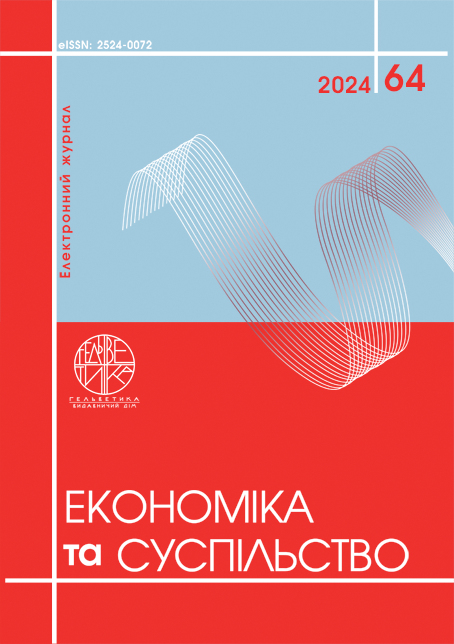ПРІОРИТЕТИ РОЗВИТКУ ЕКОНОМІКИ В УМОВАХ ПІСЛЯВОЄННОГО ВІДНОВЛЕННЯ: АНАЛІЗ СВІТОВОГО ДОСВІДУ
Анотація
Стаття присвячена комплексному аналізу пріоритетів та стратегій економічного відновлення в поствоєнний період на прикладі досвіду різних країн і з урахуванням можливостей його застосування в Україні. Результати дослідження свідчать про те, що комплексний підхід до післявоєнного відновлення, який включає реконструкцію інфраструктури, економічні реформи, розвиток людського капіталу, ефективне використання міжнародної допомоги та інституційні реформи, є критично важливим для успішного відновлення України. Зокрема, досвід Хорватії показує важливість стратегічного планування, локалізованих проектів та євроінтеграції як каталізатора для реформ. Крім того, дослідження підкреслює важливість координації міжнародної допомоги та забезпечення прозорості управління для підвищення довіри між владою та суспільством.
Посилання
Acemoglu D., Johnson S., Robinson J. A. The Colonial Origins of Comparative Development: An Empirical Investigation. American Economic Review. 2001. № 91(5). P. 1369–1401. DOI: https://doi.org/10.1257/aer.91.5.1369
Addison T., Chowdhury A. R., Murshed S. M. By How Much Does Conflict Reduce Financial Development? World Institute for Development Economics Research. 2002. URL: https://epublications.marquette.edu/cgi/viewcontent.cgi?article=1491&context=econ_fac
Arndt Ch., Jones S., Tarp, F. Aid, Growth, and Development: Have We Come Full Circle?. Journal of Globalization and Development. 2010. Vol. 1. Article 5. DOI: https://doi.org/10.2202/1948-1837.1121
Becker G. S. Human Capital: A Theoretical and Empirical Analysis, with Special Reference to Education (3rd ed.). University of Chicago Press, 1993. 392 p. DOI: https://doi.org/10.7208/chicago/9780226041223.001.0001
Bicanic I., Franičević V. Understanding reform: The case of Croatia. 2003. URL: https://wiiw.ac.at/understanding-reform-the-case-of-croatia-dlp-3287.pdf
Collier P., Hoeffler A. Greed and Grievance in Civil War. Oxford Economic Papers. 2004. № 56(4). P. 563–595. DOI: https://doi.org/10.1093/oep/gpf064
De Long J. B., Eichengreen B. The Marshall Plan: History's Most Successful Structural Adjustment Program. National Bureau of Economic Research. Working Paper. 1991. № 3899. DOI: https://doi.org/10.3386/w3899
Knack S. Aid Dependence and the Quality of Governance: Cross-Country Empirical Tests. Southern Economic Journal. 2001. № 68. P. 310–329. DOI: https://doi.org/10.2307/1061596.
Noy I., Vu T. B. The Economics of Natural Disasters in a Developing Country: The Case of Vietnam. Journal of Asian Economics. 2010. № 21(4). P. 345–354. DOI: https://doi.org/10.1016/j.asieco.2010.03.002
Paris R. At War’s End: Building Peace after Civil Conflict. Cambridge: Cambridge University Press, 2004. 304 p. DOI: https://doi.org/10.1017/CBO9780511790836
Stepputat F. Global Governance and the New Wars: The Merging of Development and Security. Journal of Refugee Studies. 2002. № 15. P. 120–121. DOI: https://doi.org/10.1093/jrs/15.1.120
Tanner M. Croatia: A nation forged in war (2nd ed.). Yale University Press, 2010. 384 p. DOI: https://www.jstor.org/stable/j.ctt1npzsd
Acemoglu, D., Johnson, S., Robinson, J. A. (2001). The Colonial Origins of Comparative Development: An Empirical Investigation. American Economic Review, 91(5), 1369–1401. DOI: https://doi.org/10.1257/aer.91.5.1369
Addison, T., Chowdhury, A. R., Murshed, S. M. (2002). By How Much Does Conflict Reduce Financial Development? World Institute for Development Economics Research. Available at: https://epublications.marquette.edu/cgi/viewcontent.cgi?article=1491&context=econ_fac
Arndt, Ch., Jones, S. Tarp, F. (2010). Aid, Growth, and Development: Have We Come Full Circle?. Journal of Globalization and Development, Vol. 1. Article 5. DOI: https://doi.org/10.2202/1948-1837.1121
Becker, G. S. (1993). Human Capital: A Theoretical and Empirical Analysis, with Special Reference to Education (3rd ed.), University of Chicago Press. DOI: https://doi.org/10.7208/chicago/9780226041223.001.0001
Bicanic, I., Franičević, V. (2003). Understanding reform: The case of Croatia. Available at: https://wiiw.ac.at/understanding-reform-the-case-of-croatia-dlp-3287.pdf
Collier, P., Hoeffler, A. (2004). Greed and Grievance in Civil War. Oxford Economic Papers, 56(4), 563–595. DOI: https://doi.org/10.1093/oep/gpf064
De Long, J. B., Eichengreen, B. (1991). The Marshall Plan: History's Most Successful Structural Adjustment Program. National Bureau of Economic Research. Working Paper No. 3899. DOI: https://doi.org/10.3386/w3899
Knack, S. (2001). Aid Dependence and the Quality of Governance: Cross-Country Empirical Tests. Southern Economic Journal, 68, 310–329. DOI: https://doi.org/10.2307/1061596
Noy, I., Vu, T. B. (2010). The Economics of Natural Disasters in a Developing Country: The Case of Vietnam. Journal of Asian Economics, 21(4), 345–354. DOI: https://doi.org/10.1016/j.asieco.2010.03.002
Paris, R. (2004). At War’s End: Building Peace after Civil Conflict, Cambridge: Cambridge University Press. DOI: https://doi.org/10.1017/CBO9780511790836
Stepputat, F. (2002). Global Governance and the New Wars: The Merging of Development and Security. Journal of Refugee Studies, 15, 120–121. DOI: https://doi.org/10.1093/jrs/15.1.120
Tanner, M. (2010). Croatia: A nation forged in war (2nd ed.), Yale University Press. Available at: https://www.jstor.org/stable/j.ctt1npzsd


